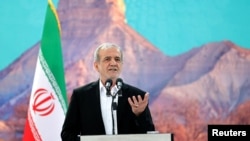Speaking to journalists on Sunday, however, Iranian President Masoud Pezeshkian voiced concerns over a United States role in building the road through Armenia’s southern Syunik province, which borders the Islamic Republic.
The connectivity project – named the Trump Route for International Peace and Prosperity (TRIPP) in honor of U.S. President Donald Trump – was announced as part of a political declaration signed by the leaders of Armenia, Azerbaijan, and the United States during a ceremony at the White House on August 8. It is intended to provide unimpeded connectivity between mainland Azerbaijan and its western Nakhichevan exclave, “with reciprocal benefits for international and intra-state connectivity for the Republic of Armenia.”
Under the declaration, Armenia commits to working with the U.S. and “mutually determined third parties” to set forth a framework for the TRIPP connectivity project in Armenian territory.
Iran’s Mehr news agency quoted the Iranian president as downplaying media hype surrounding the matter.
“Of course, this corridor is not what has been exaggerated about in the news,” Pezeshkian said. “The framework of preserving territorial integrity, establishing a connection with Europe, and not cutting off it with the north, which was meant by the Islamic Republic, have been witnessed in this issue.”
He added, however, that “the only matter of concern is that an Armenian company and an American company want to build this road.”
In an earlier statement, Iran’s Foreign Ministry welcomed the finalization of a peace agreement between Armenia and Azerbaijan, but expressed concern over “the negative consequences of any form of foreign intervention, especially near its shared borders, that could undermine the security and lasting stability of the region.”
Answering questions from the media on Saturday, Armenian Prime Minister Nikol Pashinian insisted that the TRIPP has no military component and poses no threat to Iran. He stressed that the project could open new avenues for regional cooperation involving countries like Iran and Russia.
“This project can become a good opportunity to start economic cooperation between the Islamic Republic of Iran and the United States, and between the Russian Federation and the United States,” the Armenian leader said.
Speaking to reporters on the same subject, Iran’s Foreign Minister Abbas Araghchi also emphasized that what is being discussed is not a corridor, but a transit road that will be built under Armenia’s sovereignty and jurisdiction.
“Of course, as stated in the statement of the Ministry of Foreign Affairs, any foreign presence in the region, in any form, can have negative consequences for the peace and stability of the region. We have always raised this issue with the Azerbaijani and Armenian sides and will continue to emphasize it. We are closely monitoring developments. So far, our principled positions have been respected, but the possible presence of the American company is a cause for concern and we will continue our consultations in this regard,” he said, as quoted by Iran’s state-run IRNA news agency.
Araghchi also announced scheduled phone calls with Armenia’s foreign minister and prime minister on Monday, as well as a visit by Armenia’s deputy foreign minister to Tehran on Tuesday.
“We are in continuous consultations with the parties,” he concluded.




